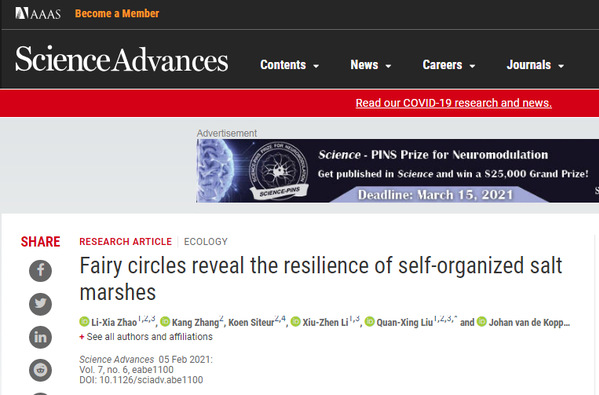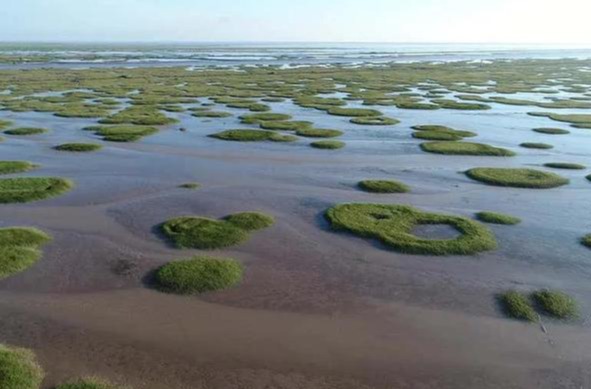On February 5, “Fairy circles reveal the resilience of self-organized salt marshes” was jointly published by East China Normal University (ECNU) and Dutch scientists. The results were published inScience Advances.

This study first revealed the formation mechanism of the fairy circle pattern in coastal wetland ecosystem and its ecological elasticity, and put forward a transient pattern which is a new spatial self-organization concept.

Fairy circles on salt marshes in Shanghai
Spatial patterning is a fascinating theme in both theoretical and experimental ecology. It reveals resilience and stability to withstand external disturbances and environmental stresses. However, existing studies mainly focus on well-developed persistent patterns rather than transient patterns in self-organizing ecosystems. Here, combining models and experimental evidence, the study shows that transient fairy circle patterns in intertidal salt marshes can both infer the underlying ecological mechanisms and provide a measure of resilience.
The models based on sulfide accumulation and nutrient depletion mechanisms reproduced the field-observed fairy circles, providing a generalized perspective on the emergence of transient patterns in salt marsh ecosystems. Field experiments showed that nitrogen fertilization mitigates depletion stress and shifts plant growth from negative to positive in the center of patches. Hence, nutrient depletion plays an overriding role, as only this process can explain the concentric rings. The findings imply that the emergence of transient patterns can identify the ecological processes underlying pattern formation and the factors determining the ecological resilience of salt marsh ecosystems.
Zhao Lixia, a doctoral candidate from the State Key Laboratory of Estuarine and Coastal Research (SKLEC) and the School of Ecological and Environmental Sciences of ECNU, is the first author of the paper. Professor Liu Quanxing from the School of Ecological and Environmental Sciences and SKLEC, and Professor Johan v.d Koppel from the Royal Netherlands Institute of Sea Research, are the co-corresponding author. Other authors include Professor Li Xiuzhen from SKLEC, Zhang Kang, Ph.D. candidate, and Koen siteur, postdoctor, School of Ecological and Environmental Sciences.

Professor Liu Quanxing
Related news:
New Scientist:
https://www.newscientist.com/article/2266985-salt-marsh-fairy-circles-go...
Global News:
https://na.glbnews.com/02-2021/52781356304989/
Inverse:
https://www.inverse.com/science/otherworldly-fairy-circles-reveal-optimistic-signal
Source: ECNU State Key Laboratory of Estuarine and Coastal Research (SKLEC)
Copy editor: Joshua Mayfield
Editor: Yuan Yiwei
